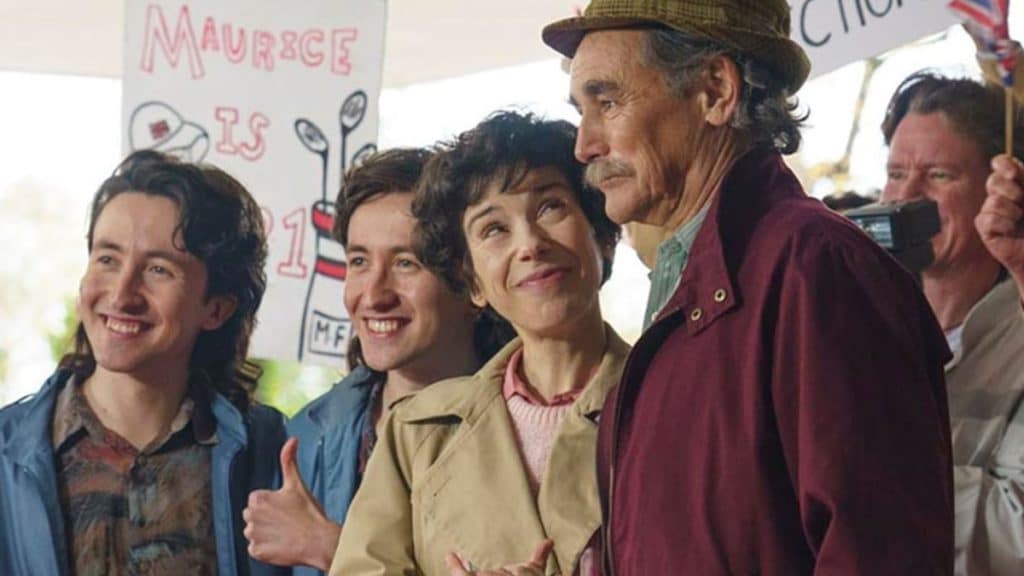Read also:
How to Watch FX Live Without CableHow To Watch AMC Without CableHow to Watch ABC Without CableHow to Watch Paramount Network Without CableMark Rylance reaches for the moon in this charming tale about the “The World’s Worst Golfer.”
In 1974, a crane operator named Maurice Flitcroft watched the Piccadilly World Match Play Championship (a golf tournament) and decided that he would take up the game. Not as a fun new hobby, though. No, he intended to play at the British Open. Supported by his wife Jean, Maurice did indeed enter and play in the qualifying round of the Open after fibbing on his paperwork that he was a professional. He scored 121 and ended up summarily banned. Over the years, Flitcroft would attempt to re-enter the Open, using costumes and pseudonyms. If this all sounds handcrafted for immortalization on film, then you’re in luck.
Based on Simon Farnaby (who also wrote the screenplay) and Simon Murray’s 2010 book of the same title, The Phantom of the Open is a sweet slip of a film, a portrait of a man whose dreams might have seemed just a touch ridiculous, but really, whose aren’t? Directed by Craig Roberts with a whimsical touch and a good deal of respect for its subject, The Phantom of the Open manages the feat of making said subject amusing without being a joke.
Presented as a lengthy flashback during bookended interview segments, Maurice (Mark Rylance) sketches his early life–his wartime childhood, meeting his wife Jean (Sally Hawkins) and adopting her son Mike, the birth of their twins. Then he launches into the strange misadventure that was his career as a golfer. When Maurice learns that he and his coworkers are at risk of losing their jobs, he happily encourages his fellows to embrace the unknown and follow their dreams, though he confesses he’s unsure what that means for him.

After watching a golf tournament on television, Maurice acquires a book about golf, some secondhand clubs, and a selection of golf clothes of questionable provenance and goes about teaching himself the game. When the British Open accepts his haphazard application, Maurice and his sons James and Gene (Jonah Lees and Christian Lees) pile into the family car and head off into infamy.
After Maurice’s performance at the British Open, the film shifts its focus from a man with a dream to one dealing with the fallout of that dream. Jean hides late bills from her husband as their sons’ dreams (of being professional disco dancers) are on shaky ground. Maurice contends with being both a bit of an icon and a bit of an international joke. A subplot revolving around eldest Flitcroft son Mike’s (Jake Davies) embarrassment with Maurice’s antics (and their possible effect on Mike’s career) never fully crystallizes into anything beyond the requisite naysayer role so necessary to a free spirit’s story.
Still, the tension between Mike and the rest of his family is realistically uncomfortable. That’s one of the film’s many charms–the dialogue, while a little treacly at times, is heartfelt and lived in. These are words that people actually use with one another (which shouldn’t seem like a point worth mentioning, but it is).
The strength of The Phantom of the Open owes a great deal to the performances of Rylance and Hawkins, both playing sweet, supportive characters whose affection for each other and their family colors every interaction. Surrounded by a solid supporting cast and a downright fun soundtrack of period-appropriate hits, Roberts’ direction uses magical elements and dreamy lighting to remind us that we’re being told a story by a man who believes that anything is possible.
It’s not a perfect film, leaning a bit heavily at times on Rylance’s performance rather than plot movement, and it can be too precious for its own good. All in all, however, it’s a pleasant and funny time with these characters. It even managed to make golf interesting for this reviewer. And that, my friends, is movie magic.
The Phantom of the Open is in theaters now.